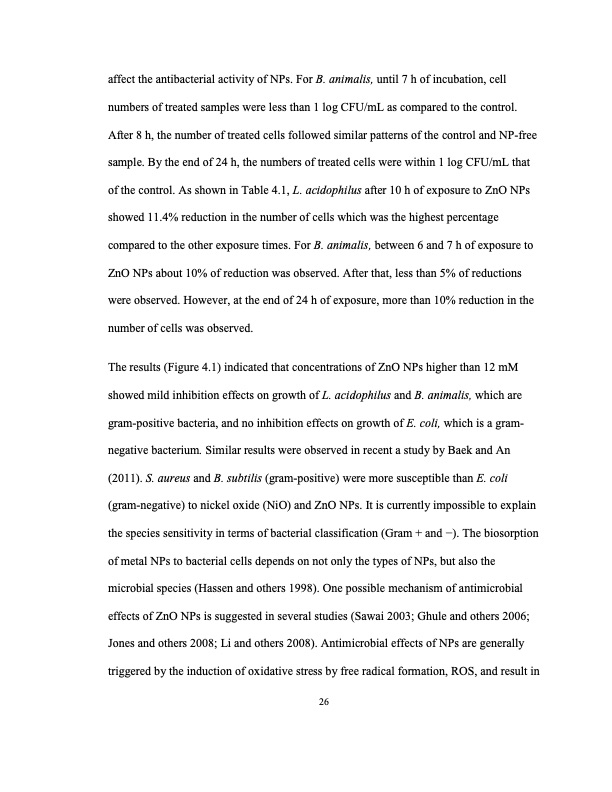
PDF Publication Title:
Text from PDF Page: 037
affect the antibacterial activity of NPs. For B. animalis, until 7 h of incubation, cell numbers of treated samples were less than 1 log CFU/mL as compared to the control. After 8 h, the number of treated cells followed similar patterns of the control and NP-free sample. By the end of 24 h, the numbers of treated cells were within 1 log CFU/mL that of the control. As shown in Table 4.1, L. acidophilus after 10 h of exposure to ZnO NPs showed 11.4% reduction in the number of cells which was the highest percentage compared to the other exposure times. For B. animalis, between 6 and 7 h of exposure to ZnO NPs about 10% of reduction was observed. After that, less than 5% of reductions were observed. However, at the end of 24 h of exposure, more than 10% reduction in the number of cells was observed. The results (Figure 4.1) indicated that concentrations of ZnO NPs higher than 12 mM showed mild inhibition effects on growth of L. acidophilus and B. animalis, which are gram-positive bacteria, and no inhibition effects on growth of E. coli, which is a gram- negative bacterium. Similar results were observed in recent a study by Baek and An (2011). S. aureus and B. subtilis (gram-positive) were more susceptible than E. coli (gram-negative) to nickel oxide (NiO) and ZnO NPs. It is currently impossible to explain the species sensitivity in terms of bacterial classification (Gram + and −). The biosorption of metal NPs to bacterial cells depends on not only the types of NPs, but also the microbial species (Hassen and others 1998). One possible mechanism of antimicrobial effects of ZnO NPs is suggested in several studies (Sawai 2003; Ghule and others 2006; Jones and others 2008; Li and others 2008). Antimicrobial effects of NPs are generally triggered by the induction of oxidative stress by free radical formation, ROS, and result in 26PDF Image | ZINC OXIDE AND SILVER NANOPARTICLES ON INTESTINAL BACTERIA

PDF Search Title:
ZINC OXIDE AND SILVER NANOPARTICLES ON INTESTINAL BACTERIAOriginal File Name Searched:
thesis-zinc-oxide-silver-nano.pdfDIY PDF Search: Google It | Yahoo | Bing
Turbine and System Plans CAD CAM: Special for this month, any plans are $10,000 for complete Cad/Cam blueprints. License is for one build. Try before you buy a production license. More Info
Waste Heat Power Technology: Organic Rankine Cycle uses waste heat to make electricity, shaft horsepower and cooling. More Info
All Turbine and System Products: Infinity Turbine ORD systems, turbine generator sets, build plans and more to use your waste heat from 30C to 100C. More Info
CO2 Phase Change Demonstrator: CO2 goes supercritical at 30 C. This is a experimental platform which you can use to demonstrate phase change with low heat. Includes integration area for small CO2 turbine, static generator, and more. This can also be used for a GTL Gas to Liquids experimental platform. More Info
Introducing the Infinity Turbine Products Infinity Turbine develops and builds systems for making power from waste heat. It also is working on innovative strategies for storing, making, and deploying energy. More Info
Need Strategy? Use our Consulting and analyst services Infinity Turbine LLC is pleased to announce its consulting and analyst services. We have worked in the renewable energy industry as a researcher, developing sales and markets, along with may inventions and innovations. More Info
Made in USA with Global Energy Millennial Web Engine These pages were made with the Global Energy Web PDF Engine using Filemaker (Claris) software.
Infinity Turbine Developing Spinning Disc Reactor SDR or Spinning Disc Reactors reduce processing time for liquid production of Silver Nanoparticles.
| CONTACT TEL: 608-238-6001 Email: greg@infinityturbine.com | RSS | AMP |